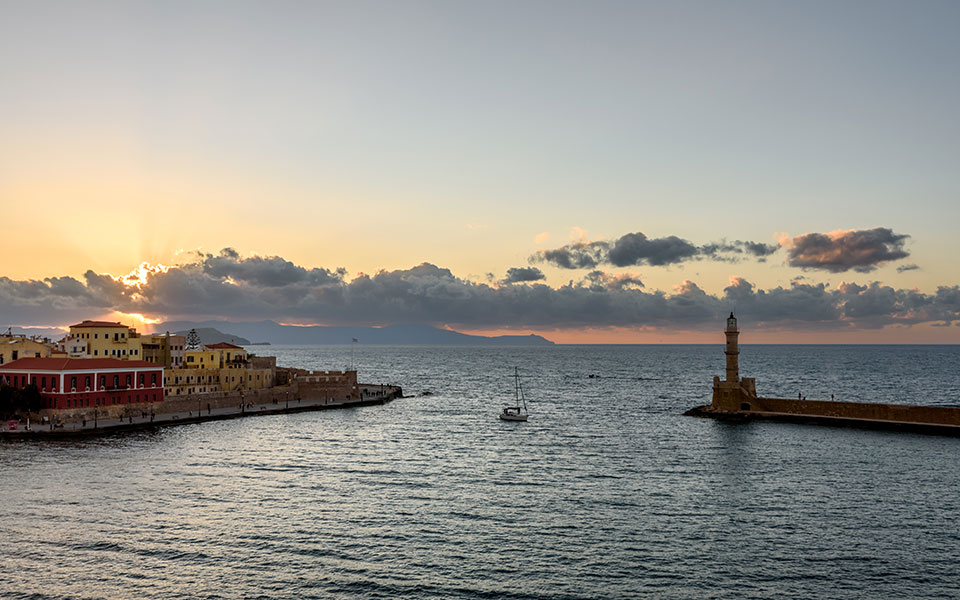The new Archaeological Museum of Hania seems to be emerging from the ground, a reference to the antiquities that remain hidden underneath. It opened its doors in April in the Chalepa district, comprising two modern, bioclimatic structures designed by Bobotis+Bobotis Architects. In fact, both the Chalepa and the neighboring Tabakaria districts are gradually earning their place on the city’s tourism highlights.
As the director of the Ephorate of Antiquities of Hania Eleni Papadopoulou explains, the clay sealing (seal impression) dubbed the “Master Impression” stands out among the museum exhibits. I carefully observe this small object and the accompanying hologram that showcases its details. It is the imprint of a gold ring excavated with traces of burning in Kastelli in Hania, depicting an impressive three-story Minoan palace. It seems incredible that this was what this hill once looked like, where today the locals and visitors of Hania come to admire views of the old harbor and the sunset.
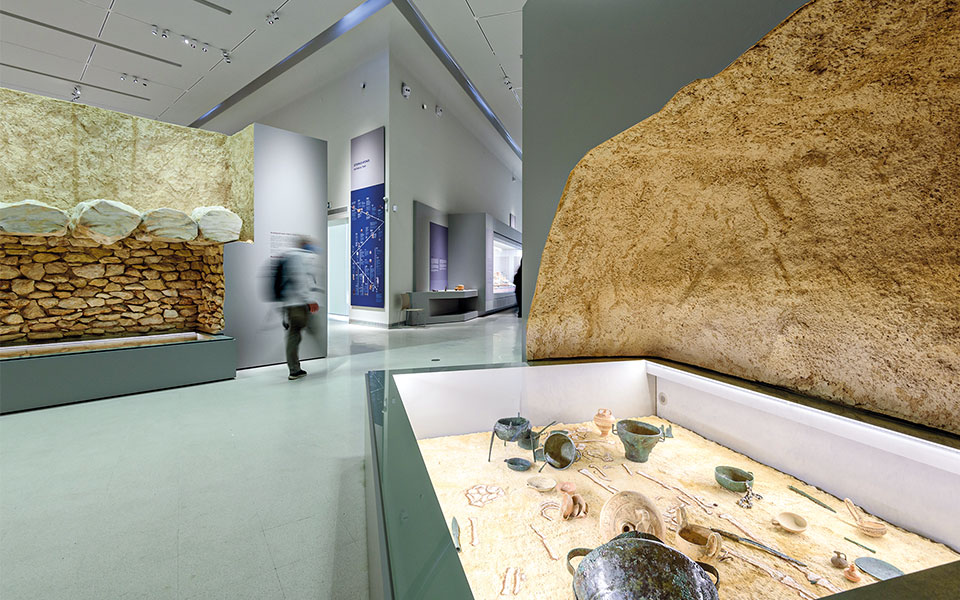
© Ioannis Chatziioannou
One of the most charming characteristics of the museum is how it sheds light on the everyday life of the island’s inhabitants over the course of millennia: from the stone ax discovered in Gavdos, a multitool more than 200,000 years old, to the precise reconstruction of an ancient kitchen. There are also exhibits that allow you to connect not only with the objects, but with the emotions of the ancient peoples who possessed them. For instance, the “Miser’s House” represents the house of a wealthy couple that rushed to the basement to save its fortune during the great earthquake of 365 A.D., which completely destroyed the island. The couple was found buried next to three containers filled with coins, while a few meters away in a cooking pot the remains of seafood were discovered – perhaps the last meal the couple was able to enjoy.
The 27 marble sculptures of children from the Asklepieion of Lissos are another impressive exhibit. They are placed in three rows, creating a theatrical setting redolent of the natural space where they were discovered, in south west Crete. In the present day, the children of Hania have already “claimed” the green spaces around the museum entrance, while a wonderful sense of familiarity imbues life into the museum’s interior as well. Among the innovations at the new Archaeological Museum of Hania visitors will find placards in Braille and tactile exhibits in the form of exact replicas of objects that visitors can explore by touch. I also viewed the fascinating first temporary exhibition, on display over the summer. In collaboration with MuCEM (the Museum of Civilizations of Europe and the Mediterranean) in Marseille and entitled “Bath Time! Body – Water – Dialogues,” this exhibition combined archaeological findings, contemporary artworks and everyday objects related to the timeless bathing practices of the Mediterranean.
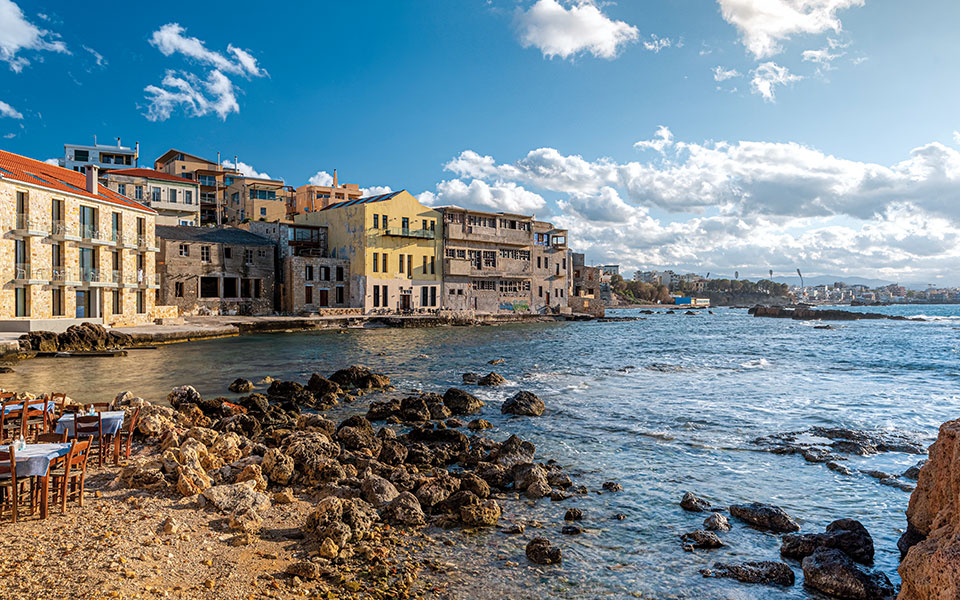
© Ioannis Chatziioannou
A new glance at Chalepa and Tabakaria
Relocating the Archaeological Museum from the Venetian monastery of Saint Francis in the Old Town to the Chalepa district coincides with an expansion of tourist interest in this direction. Chalepa is one of the most historic areas of the city, evidenced by the elegant neoclassical residences that still survive. Monuments that remind us that Hania was once the capital of the Cretan State include the Venizelos Residence that has now become a museum, the French School and the church dedicated to Agia Magdalini (St. Mary Magdalene), a present from the Grand Duke of Russia in memory of his wife’s stay in the city.
Hania boasted a cosmopolitan aura in the early 1900, as evidenced by the remains of buildings that once housed the consulates of the great European powers. Some of these, for instance the Villa Blanche, have been restored as boutique hotels architect Menis Varoudakis explains, as he shows me the facades and photographs of grandiose buildings, as well as former tanneries in the area. The coastal front of Tabakaria and nearby Agia Kyriaki boasts some 100 tanneries, created from the Egyptian occupation. Their enchanting derelict aspect is changing with the years, as some of the older buildings are brought back to life in the form of luxury hospitality spaces.
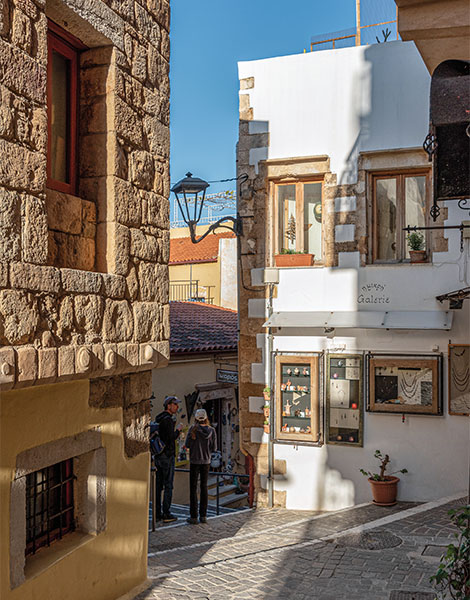
© Ioannis Chatziioannou
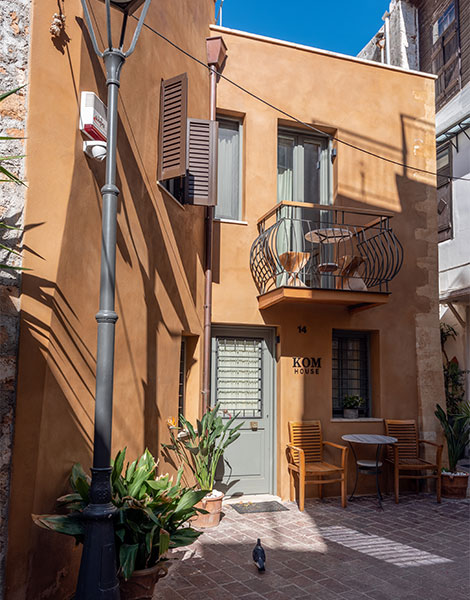
© Ioannis Chatziioannou
Artistic events in the Old Town
We can also enjoy several of the historic monuments in the Old Town from a different perspective. This thought comes to mind as I enter the Firka Fortress, on the edge of the old harbor. I discovered this space last summer, where I watched a theatrical performance in the context of the Open Sails cultural festival, a new institution of the Municipality of Hania where young artists create works inspired by the city’s landmarks, histories and famous personages. In an effort to enhance its cultural profile, Hania also organized the city’s first Book Festival this summer, featuring important Greek and foreign writers as guests, while the Dance Days Hania Festival and Hania Film Festival are classic choices in the local cultural scene.
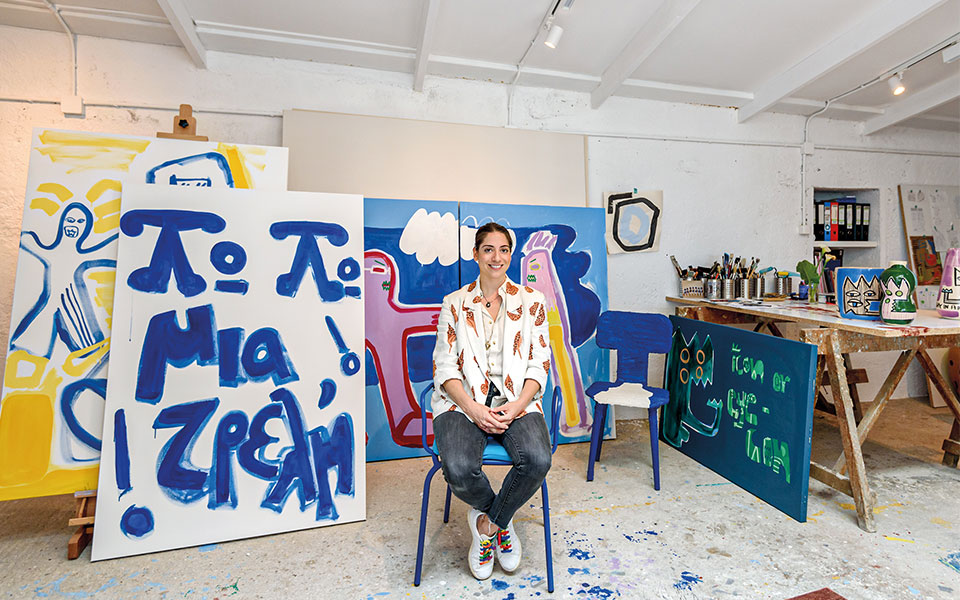
© Ioannis Chatziioannou
Leaving the Firkas Fortress and in search of areas that still preserve their authenticity, I walk through the narrow streets of Topana, behind the Maritime Museum. There, as at Splantzia, we can find a blending of elements from the city’s Venetian and Ottoman aspects. In search of spots that stand out for their contemporary creativity, I visit the Knife District and the Baba Yianka workshop-store. This is where Giorgos Igglezakis makes leather belts and bags by hand, including one design inspired by the traditional vourgia bags.
My artistic walk through the city comes to an end with Alexandra Manousakis’ art studio. Housed at Miami restaurant, she is inspired by conversations with patrons as she creates her artworks. Her work currently deals with themes such as the power of the image in social media, she explains as she shows me a painting depicting a small green monster entitled “Icon or eye-con?” This question could not be more timely.
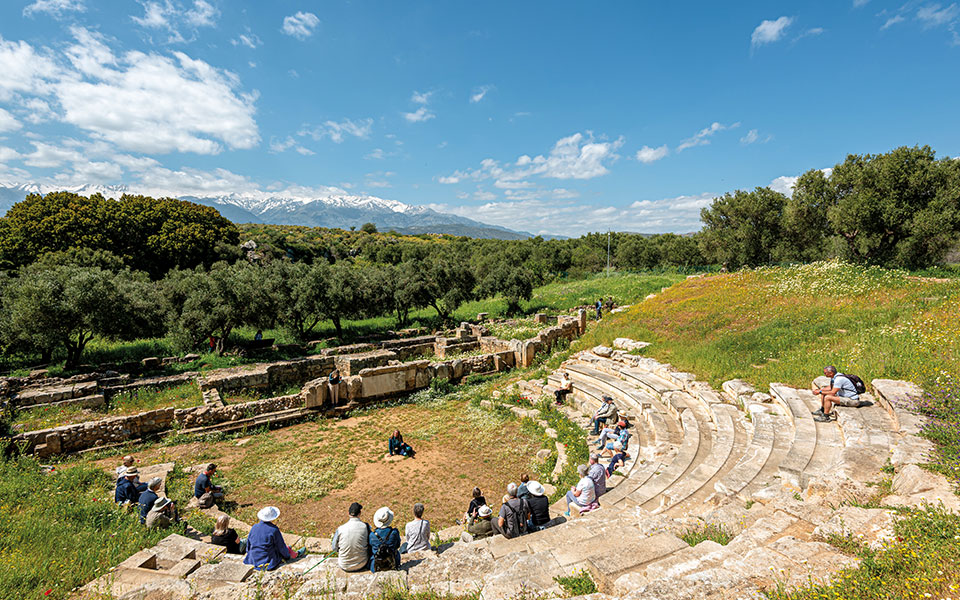
© Ioannis Chatziioannou
The secrets of Aptera
Aptera is another Hania classic, being one of the most important cities in ancient Crete and one of the island’s less explored archaeological treasures. This ancient city featured luxurious Roman houses, baths and an aqueduct, but its most charming element is the ancient theater. I follow Giorgos Mastrantonakis, the site guard, as he strays from the flowery stone pathway to climb the hill leading to the top of the cavea. From here, the theater seats embrace the olive trees, while where the multi-story Roman “skene” once stood, we can now see the snow-capped peaks of the White Mountains in the distance. We take a seat and Giorgos urges me to listen carefully.
The bells of a nearby herd of sheep compose a musical recital, yet I realize there is another special role in store for me in this “performance” as we go down the steps to reach the orchestra. Giorgos encourages me to stand on the ancient stone in the middle and to speak. Following his instructions, I listen to my words bounce back at me in the form of a crystal clear echo. I am surprised but enchanted with this otherworldly sense and continue to search for words, naming everything I can see in front of me: “flowers, grass, theater, stone, sky, I speak, I listen, I speak…”. There are many ways to experience the culture of a place as a traveler, and the most unexpected are probably the most beautiful.

